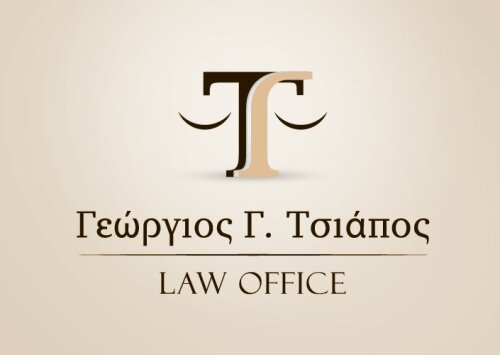Best Retirement Lawyers in Greece
Share your needs with us, get contacted by law firms.
Free. Takes 2 min.
Or refine your search by selecting a city:
List of the best lawyers in Greece
About Retirement Law in Greece
Retirement in Greece is governed by a statutory system of social security and private pension schemes. The Greek retirement system has undergone significant reforms in recent years, primarily in response to economic challenges and pressure from the European Union. Greek law provides for different retirement ages and benefits based on a person's year of birth, career length, and type of employment. Greece also offers pensions for specific groups like public servants, military personnel, and certain labor sectors.
Why You May Need a Lawyer
There are several situations where individuals may require legal assistance related to retirement in Greece. These include navigating complex pension reforms, disputes over pension entitlement, errors in pension calculation, cross-border retirement issues for expatriates, early retirement options, and understanding tax implications on pensions. Legal professionals can provide invaluable assistance in understanding the intricacies of Greek retirement law, ensuring compliance with rules, and advocating for fair treatment.
Local Laws Overview
Key aspects of local law relevant to retirement in Greece include:
- The legal retirement age, which can vary based on occupation and personal circumstances but is gradually increasing in line with EU recommendations.
- Full pension eligibility requirements, which often depend on the length of insurance contributions and total working years.
- Mandatory contributions to Greece's social security funds, known as EFKA, which play a vital role in determining pension benefits.
- Introduction of supplementary pensions and private pension schemes, which are becoming increasingly popular as a way to ensure a higher retirement income.
- Laws addressing pension cuts and adjustments, introduced as part of austerity measures, affecting the amount of pension received.
Frequently Asked Questions
What is the current legal retirement age in Greece?
The retirement age in Greece is currently set to gradually increase, reaching 67 years for both men and women. However, exceptions may apply based on years of insurance contributions and job classifications.
How are my pension benefits calculated?
Pension benefits in Greece are primarily calculated based on lifetime earnings, duration of contributions, and age at retirement. Reforms have added complexities, so consulting a legal expert may help in understanding your precise pension calculation.
Can foreigners receive pension benefits in Greece?
Foreigners who have worked and contributed to the Greek social security system can receive pension benefits. There are also bilateral agreements in place with some countries to avoid double-taxation and provide pensions to people with cross-border careers.
What happens if there are discrepancies in my pension calculations?
If you notice discrepancies, it is advisable to rectify them by contacting the relevant Greek social security office. Legal assistance may be required to ensure that your pension rights are accurately recognized and enforced.
Is early retirement an option in Greece?
Early retirement options exist under specific conditions, such as disability or long-term insurance contributions over a certain number of years. However, these options may come with penalties or reduced benefits.
How are pensions taxed in Greece?
Pensions in Greece are subject to income tax, with varying rates depending on total annual income. It's crucial to understand these tax implications and seek specialist advice if needed, especially for expatriates.
What reforms have affected Greek pensions recently?
Significant pension reforms have aimed to balance sustainability and adequacy, including increases in retirement age, changes to entitlements, and new contribution brackets. These have sometimes led to reductions in actual pension amounts.
Is it possible to receive a pension if I continue working part-time?
Working while receiving a pension is allowed, but it may affect your total pension income. There are specific rules and limits on earnings, which may trigger adjustments to pension benefits.
How should I handle cross-border retirement planning?
Cross-border retirement planning can be complex, involving coordination between different nations' social security systems. A lawyer with expertise in international retirement law can help maximize benefits and compliance.
How can I resolve disputes over my pension rights?
Pension disputes can typically be resolved through negotiation with the social security office or, if necessary, legal action. It's often beneficial to work with a lawyer experienced in retirement disputes.
Additional Resources
Here are some helpful resources for those seeking legal advice on retirement in Greece:
- The Hellenic General Secretariat for Social Insurance offers guidance on pension rights and calculations.
- The National Organisation for the Provision of Health Services (EOPYY) provides information on healthcare entitlements for retirees.
- The Greek Ministry of Labour and Social Affairs regularly updates information on pension reforms and legal guidelines.
- Legal aid organizations and local bar associations can assist with finding legal professionals specialized in retirement law.
Next Steps
If you require legal assistance regarding retirement in Greece, consider taking the following steps:
- Gather all relevant documents related to your employment and pension contributions.
- Contact a lawyer with expertise in Greek retirement law for a consultation to discuss your specific situation.
- Review any correspondence from Greek social security offices to understand your current pension entitlements.
- Stay informed about current and upcoming legal changes to the retirement landscape in Greece by regularly checking updates from official governmental sources.
Lawzana helps you find the best lawyers and law firms in Greece through a curated and pre-screened list of qualified legal professionals. Our platform offers rankings and detailed profiles of attorneys and law firms, allowing you to compare based on practice areas, including Retirement, experience, and client feedback.
Each profile includes a description of the firm's areas of practice, client reviews, team members and partners, year of establishment, spoken languages, office locations, contact information, social media presence, and any published articles or resources. Most firms on our platform speak English and are experienced in both local and international legal matters.
Get a quote from top-rated law firms in Greece — quickly, securely, and without unnecessary hassle.
Disclaimer:
The information provided on this page is for general informational purposes only and does not constitute legal advice. While we strive to ensure the accuracy and relevance of the content, legal information may change over time, and interpretations of the law can vary. You should always consult with a qualified legal professional for advice specific to your situation.
We disclaim all liability for actions taken or not taken based on the content of this page. If you believe any information is incorrect or outdated, please contact us, and we will review and update it where appropriate.
Browse retirement law firms by city in Greece
Refine your search by selecting a city.
















